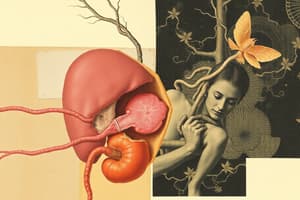Podcast
Questions and Answers
What is the primary mechanism behind viscero-visceral referral?
What is the primary mechanism behind viscero-visceral referral?
- Different afferent pathways
- Efferent nerve stimulation
- Overlapping afferent pathways (correct)
- Neurovegetative signs
In patients with IHD and gall bladder disease, what can reduce the number of angina attacks?
In patients with IHD and gall bladder disease, what can reduce the number of angina attacks?
- Muscle palpation
- Treatment of gall bladder calculi (correct)
- Hormonal therapy
- Coronary revascularization
What is a characteristic of somatic referred pain?
What is a characteristic of somatic referred pain?
- Is less likely to be associated with emotional and neurovegetative signs (correct)
- Is not associated with hyperalgesia
- Is more diffuse and widespread
- Is more likely to be associated with visceral pain
What is an example of pain syndromes with viscero-somatic referral?
What is an example of pain syndromes with viscero-somatic referral?
What is a potential consequence of somatic referred pain?
What is a potential consequence of somatic referred pain?
What is the primary mechanism behind somatic-viscero referral?
What is the primary mechanism behind somatic-viscero referral?
What can reproduce visceral pain in people with profound muscle hyperalgesia?
What can reproduce visceral pain in people with profound muscle hyperalgesia?
What is the significance of thorough history, examination, and investigations in patients with pain?
What is the significance of thorough history, examination, and investigations in patients with pain?
Flashcards are hidden until you start studying
Study Notes
Viscero-Visceral Referral
- One sensitized organ can cause sensitization of another organ when they share a common sensory afferent nerve or have afferent 'cross-talk' in the dorsal horn (DH).
- Causes of viscero-visceral referral:
- The heart and gallbladder share overlapping (T5) afferent pathways, leading to reduced angina attacks and coronary revascularization when gallbladder calculi are treated.
- The renal system and uterus share overlapping afferent nerve pathways (T10-L1 afferents), resulting in reduced renal colics when hormonal therapy is used for dysmenorrhoea.
Viscero-Somatic Referral
- Visceral pain causes referred somatic pain, requiring thorough history, examination, and investigations to determine its origin.
- Characteristics of somatic referred pain:
- Better localized
- Sharper
- Less likely to be associated with emotional and neurovegetative signs
- Somatic referred pain can be associated with:
- Hyperalgesia, resulting in increased sensitivity in muscles, skin, and subcutaneous (SC) tissue innervated by the somatic spinal nerve.
- Examples of pain syndromes with viscero-somatic referral:
- Renal colic: hypersensitive lumbar muscles (quadratus lumborum, obliques) and pain in the flank and groin, even after calculi have been passed.
- Acute myocardial ischaemia: pain in the chest radiating down the arm (C8-T1 dermatomes).
Somatic-Viscero Referral
- Similar mechanisms to those of viscero-somatic referral.
- Characteristics of somatic-viscero referral:
- Deep palpation of muscle can reproduce visceral pain in people with profound muscle hyperalgesia.
- Examples of somatic-viscero referral:
- Deep palpation in the flank and groin can elicit visceral pain from the genitourinary system, even after a renal calculi has been passed.
- Treatment of somatic referred pain can improve visceral pain.
Studying That Suits You
Use AI to generate personalized quizzes and flashcards to suit your learning preferences.



